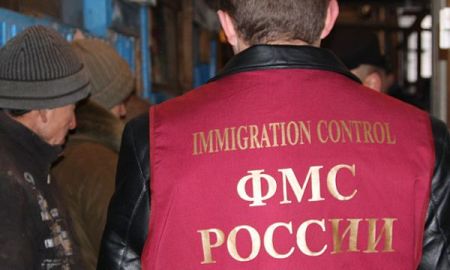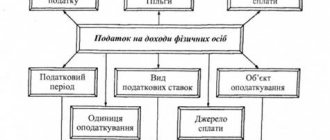What is deportation of foreigners: concept, types and differences from expulsion
The legislative framework of the Russian Federation defines the understanding of the term “deportation”. It means the expulsion of one foreign citizen or group of persons outside the country.
It is important to understand that deportation cannot be applied to a Russian citizen. The laws state that persons who have Russian citizenship cannot be expelled from the country. This is contrary to the articles of the constitution.
Migration authorities do not divide deportation into types. But it is conventionally accepted to classify it as:
- Voluntary;
- Forced.
In the first case, a foreign citizen, after receiving notification of a court decision regarding his person, leaves the country within the prescribed period. In the second, FMS officers come for him and keep him under guard until he is sent home.
There is often confusion between the concepts of “expulsion” and “deportation.” Both of these involve organizing a foreigner’s travel outside the country. But in essence there are a number of differences between these terms.
Expulsion is considered a preventive measure for violations of state laws and has the following characteristics:
- The decision is made immediately after it is made;
- The appeal takes place within 10 days;
- The decision to expel is most often made as part of a criminal case.
Deportation is ordered when the migrant has violated the migration regime. The distinctive features of this procedure are:
- Execution of the decision within five days;
- Permission to appeal deportation within 90 days;
- The only responsible person is the FMS.
What is deportation

The concept of “deportation” can be found in Law No. 115-FZ “On the legal status of foreign citizens in the Russian Federation.” In this law, deportation means the forced expulsion of a foreign person from the Russian Federation if there are no legal grounds for his stay in Russia. The main reason for deportation is violation of the rules of migration legislation. These include the following cases:
- Cancellation of a work permit;
- Absence or cancellation of temporary residence permit, residence permit;
- Overstayed visa.
This is one of the most effective ways to deal with illegal entry into the country. Deportation also allows foreign citizens who are persistent lawbreakers to be removed from the country. It should be remembered that deportation cannot be carried out just like that - this is a very serious measure that requires the presence of many different conditions and factors. However, in the end, its goal is always the same - either to return a criminal who is unable to live according to Russian laws to his homeland, or to comply with the legality of the stay of foreigners in Russia.
Why they can be deported from Russia: grounds, preferential categories of citizens
You may also like
1
Filling out the form to participate in the program...
5 484
There are actually few reasons on which the decision to deport is made:
- The end of the permitted period of stay in the country (72 hours are given for voluntary departure);
- Cancellation of permits (15 days are allowed for departure);
- False documents on the basis of which a foreigner is on the territory of Russia;
- Violation of laws;
- Employment in the absence of a work permit.
Not all persons are subject to deportation. The law provides for preferential categories of foreigners who cannot be subjected to this procedure:
- Visitors with refugee status;
- Foreigners who have received asylum for political reasons;
- Persons who have citizenship of states on whose territory hostilities are taking place;
- Diplomatic mission employees.
The issue of deportation of foreign citizens whose husbands/wives have Russian citizenship raises many questions. The list of grounds for canceling deportation by the FMS has included the following item: “The presence of close relatives who are residents of the Russian Federation.” But in this case the decision is not automatically canceled.
A foreigner has the opportunity to contact a migration lawyer and appeal the decision within the prescribed period.
How foreign citizens and stateless persons are deported from Russia
Deportation procedures vary depending on whether the migrant is in hiding or not. If, after receiving a deportation notice, a foreigner voluntarily leaves the country (within 5 days), then at the border he will simply be stamped with a subsequent ban on entry into Russia. It is placed on the migration card and duplicated in the passport.

In a situation where a migrant refuses to return to his homeland, FMS employees begin searching for him. After detection, the foreigner is taken into protective custody.
The procedure for deportation is as follows:
- Confinement without the right to leave in a special room (with all living conditions);
- Catering and medical care;
- Escort to the border;
- Placing a stamp on the ban on return to the country;
- Transfer through passport control.
After this, the foreigner will receive a paper describing the consequences of illegally crossing the border before the expiration of the due date. Anyone who decides to break the established rules and enter the country will be prosecuted by law. The migrant will bear not only administrative, but also criminal liability.
All expenses for returning home are borne by the migrant himself. If he does not have enough funds to pay for his maintenance and travel, then the expenses will have to be paid by:
You may also like
1
Finding suitable work with temporary residence permits in the Russian Federation
2 768
- Relatives;
- Inviting party;
- Embassy;
- Government of the Russian Federation.
How to cancel deportation and lift the entry ban

So, for what reasons can you cancel your deportation and avoid deportation from the country with a subsequent ban on entry? Deportation may be canceled for the following reasons:
- If your relatives who have Russian citizenship live in Russia;
- If you are married to a citizen of the Russian Federation, or if your child is a citizen;
- If at the time of the announcement of deportation you had documents such as a temporary residence permit, residence permit, work permit or patent;
- If you are a student at a Russian educational institution during the period of time when you are deported;
- If you are undergoing treatment in Russia.
But before the deportation is lifted, you will have to go through a lot. You should not think that deportation will be canceled automatically only because of the presence of the above factors. It can only be canceled in court if you can provide a full package of relevant documents. It is quite possible to avoid punishment; the main thing is to competently approach the trial. The best approach is to engage an experienced lawyer who knows the meaning of each legal term and the specifics of each process.
The result of a successful trial can be not only the cancellation of deportation and the cancellation of expulsion - you can lift the ban on entry into the Russian Federation. Lifting the ban is a great achievement, and statistics show that in recent years many cases have ended in favor of migrants. Cancellation of deportation and entry ban occurs only if the process is carried out competently, so it is impossible to do without the participation of a lawyer.
Since the beginning of 2013, deportation has become an even more severe form of punishment. Now anyone who has been deported by a court for the third time is deprived of the right to enter the Russian Federation for 10 years.
Punishments have also become more severe for milder violations of migration registration rules. Violators will face significant monetary fines, the amount of which will vary depending on the severity of the crime.
Penalties are imposed for such offenses as:
- Failure to comply with migration registration rules;
- Work without appropriate permission;
- Failure to comply with the rules of arrival in the Russian Federation, as well as the rules of stay in the country.
For such violations, there is a significant fine of up to 7,000 rubles, and forced deportation from the country. True, in this case you are not threatened with deportation, but with administrative expulsion, which cannot be called a great consolation.
How to cancel deportation and return to Russia
It is best to remove deportation with the help of a migration lawyer. 10 days are given for this. The lawyer collects the grounds that a foreigner cannot leave the territory of the Russian Federation.
The most common reasons cited are:
- Presence of close relatives with the status “Citizen of the Russian Federation” (confirmation of relationship is required);
- Belonging to preferential categories.
In addition, the following grounds are considered valid:
- Treatment;
- Availability of a residence permit or working patent;
- Education.
The lawyer prepares a claim in court based on the available documents. And already in the process of considering the case, he seeks to have the deportation decision reversed. This can be done without the personal presence of the interested party; his rights will be defended by a trusted person - a lawyer. The appeal procedure in court lasts from 30 to 90 days.
How can a citizen of Kazakhstan appeal against deportation from Russia: step-by-step instructions
If you want to appeal the decision on deportation, you can contact the senior manager of the Department of Internal Affairs of the Ministry of Internal Affairs or the court. In the first case, you need to do the following:
- Prepare all documents confirming the existence of grounds for appeal. You can do this yourself or contact a specialist law firm.
- Write an application and submit it along with other documents to an authorized person.
- Wait for the decision to cancel the deportation.
The period for consideration of the application is 10 calendar days, after which you will be given a final document, on the basis of which you can stay in the Russian Federation.
Going to court looks about the same, only the case is considered through administrative proceedings.
Documents for appeal
Along with the application, the following documents must be submitted to the authorized body:
| Name | Where to get | Validity |
| Certified translation of internal passport | The passport is issued in Kazakhstan, a copy can be made and certified at a notary office in the Russian Federation | Copy – 3 months, passport – until replacement due to age or due to change of full name. |
| RVP, residence permit or other document confirming the right to reside in Russia | Department of Internal Affairs of the Ministry of Internal Affairs at the place of stay | Residence permit – 5 years with the possibility of extension, temporary residence permit – 3 years without such possibility |
| Birth certificate of a child with Russian citizenship | MARRIAGE REGISTRY | Until the child reaches 14 years of age |
| Certificate of registration of marriage with a citizen of the Russian Federation | MARRIAGE REGISTRY | Not installed |
“It’s very easy to avoid deportation - just fill out all the documents in a timely manner and not violate Russian legislation”
Kazakova V.L., head of the Department of Internal Affairs of the Ministry of Internal Affairs of the Russian Federation.
How to deport a person from Russia anonymously
Russians often experience inconvenience because of illegal immigrants living in large groups in small apartments, but they fear the revenge of foreigners. In fact, any citizen of the Russian Federation can write a statement to law enforcement agencies or the Federal Migration Service against an illegal migrant. It is drawn up in any form and does not require a signature.
To contact these structures you must:
- Present your passport;
- Describe the circumstances of the case;
- If possible, provide details of migrants (at least names).
The application is verified within a week. But FMS employees can check the information received faster. This happens in cases where the statement was written by a group of people. They can also remain anonymous. Usually, for this purpose, several neighbors agree among themselves and fill out an application.
In recent years, there have been special offices that provide services for reporting migrants to migration services. They accept information anonymously and then submit the application to the FMS themselves.









